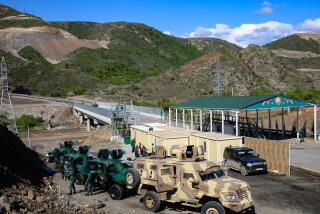2nd Round of Geneva Talks Ends in Stalemate : U.S. Says Soviets Slip Backwards; Next Session on Nuclear Arms Due Sept. 19
- Share via
GENEVA — The second round of the nuclear arms talks between the United States and the Soviet Union ended here Tuesday with the Soviets flatly reporting “no progress” and American sources saying that the discussions have actually slipped backwards on intermediate-range nuclear weapons.
While waiting for Ambassador Max M. Kampelman and the American negotiating team to arrive at the Soviet mission for a final meeting that lasted barely one hour, chief Soviet delegate Viktor P. Karpov was asked if he was satisfied with this round.
“No, I am not--not at all,” he said. “No progress.”
Reporters also asked if the planned November summit meeting in Geneva between President Reagan and Soviet leader Mikhail S. Gorbachev might have an impact on the talks.
“I wouldn’t guess,” he said. “I don’t know. It depends on the other side. We are waiting for the Americans.”
‘Greater Emphasis on Dialogue’
Kampelman read a brief formal statement to reporters three hours after the final meeting but declined to take any questions. The most positive comment he could muster was, “We recognized from the outset that agreement will not be easily or quickly arrived at, but we do note a greater emphasis on dialogue and a lesser emphasis on polemics.”
The negotiators will return to Geneva on Sept. 19 for six weeks of talks.
In Washington, White House spokesman Larry Speakes complained that “during the second round, regrettably, the Soviet position has remained entrenched, with no movement in their formal positions.”
Three separate sets of arms control talks are being carried on simultaneously--one on strategic, or long-range, nuclear weapons; one on intermediate-range missiles, and the third on defensive weapons such as President Reagan’s proposed “Star Wars” system.
Whatever the tone of the meeting, there have been several signals that the deadlock has deepened since Gorbachev moved veteran Foreign Minister Andrei A. Gromyko upstairs to the presidency of the Soviet Union. Things were by no means flexible before, and with Gorbachev now clearly taking the reins, the Soviet delegation in Geneva is taking no chances with any liberal interpretations of his policies.
This may account for the reported Soviet backsliding in the talks about intermediate nuclear weapons--the American Pershing 2 and cruise missiles and the Soviet SS-20s, along with other smaller tactical-range nuclear arms. In the first round of the talks here from March to April, there had been some signs of flexibility on the Soviet side.
Now, the Soviets appear to be going back to the position they took in December, 1983, when they walked out of negotiations upon the deployment in Europe of the first Pershing 2 and cruise missiles.
Instead of any readiness to discuss ceilings or negotiate limits on deployment, the Soviets said the United States had no right to put any medium-range missiles in Europe and that all of the missiles already deployed would have to be removed if there was to be any superpower agreement. This seems to be the Soviet position once again.
The second evidence of hardening was the Soviet delegation’s swift, categorical denunciation last week of American newspaper reports that the Soviets had hinted at a readiness to accept American research on the Strategic Defense Initiative--sometimes called “Star Wars”--and to center negotiations on limiting testing and deployment of the space-based defense system.
American sources in Geneva were puzzled by the stories, which they said simply did not reflect what the Soviets had said here or what the U.S. delegation had reported to Washington. The American delegation spokesman said at the time that the Soviet denial of the story was correct--no such hints had been given.
All that has happened has been a somewhat more intensive discussion of the project. The Americans even arranged for the director of the Strategic Defense Initiative, Lt. Gen. James A. Abrahamson, to slip into Geneva quietly and brief members of the Soviet delegation.
This did lead to what Kampelman called “a greater emphasis on dialogue,” but it has not produced any shift in the Soviet stand that the United States must abandon the whole idea of space-based defenses if any progress is to be made on an overall nuclear arms control agreement.
The third indication of recent hardening has been the echoing of Gorbachev’s June 26 statement in Moscow that the Soviet Union might “reevaluate its position” if the Geneva talks failed to make progress.
Americans sources said they are not sure whether this is a hint of another Soviet walkout or just hard-line propaganda as part of the buildup for the Reagan-Gorbachev summit.
In his statement on the talks, Speakes said, “The Soviets surfaced some concepts which could involve possible reductions in existing strategic offensive nuclear arsenals.” But, he said, the Soviet proposal “seems designed to favor preservation of the Soviet Union’s primary area of advantage”--first-strike weaponry intended to knock out American missiles in protected, buried silos.
He said that U.S. efforts to find answers to questions about specific weapons numbers, and rates of reduction, envisioned in the Soviet proposal have been unsuccessful.
“We are disappointed that the Soviet Union has been unable to deal in concrete terms and with hard numbers, even framed as overall negotiating goals,” he said.
Times staff writer James Gerstenzang in Washington also contributed to this story.
More to Read
Sign up for Essential California
The most important California stories and recommendations in your inbox every morning.
You may occasionally receive promotional content from the Los Angeles Times.










